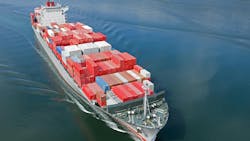Toward Sustainable Shipping
The shipping industry is not only looking towards a more sustainable method of operating, it has set goals. By 2030 U.N.’s International Maritime Organization has set a goal of reducing the industry’s greenhouse gas emissions by at teast 40%. By 2040, they want a 70% reduction, and by 2050 the objective is be net-zero.
The industry currently accounts for about 3% of global annual greenhouse gas emissions.
To address this issue, Valerie Thomas, the Anderson-Interface Chair of Natural Systems Professor in the H. Milton Stewart School of Industrial and Systems Engineering, and in the School of Public Policy is exploring alternative fuels.
“One such example is hydrogen: It doesn’t emit carbon dioxide when burned,” Thomas said in an article. “But the manufacturing of hydrogen can emit carbon dioxide, and therefore, hydrogen is not always a low-carbon fuel on a lifecycle basis."
Her perspective expands across the entire process. "It's not just about the fuels we use; it's about optimizing supply chains, reducing empty freight, and leveraging multimodal transportation options," Thomas said. "By embracing net-zero freight initiatives and maximizing efficiency in logistics, we can achieve meaningful reductions in emissions while meeting the demands of global trade."
At Georgia Tech Thomas co-leads the Net Zero Freight Systems Program. The university also supports the Georgia Tech Supply Chain and Logistics Institute, which is using reserach and practical application to increase sustainability in the global supply chain.
